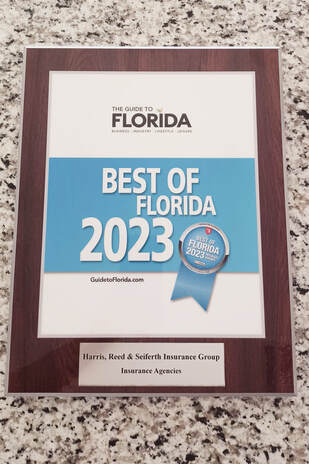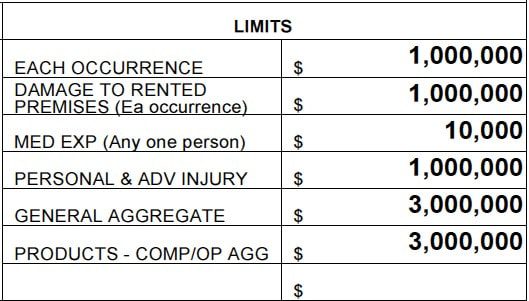Harris, Reed & Seiferth
|
 The votes have been counted and the results are in! Harris, Reed & Seiferth Insurance Group is a 2023 Best of Florida® Regional winner in Guide to Florida’s annual readers’ poll. Guide to Florida readers and editors have weighed in on the best of everything in Florida, honoring thousands of businesses and organizations in more than 25 broad business and community sectors. The process starts with a nomination on the Guide to Florida website. Voting remains open throughout the year, with tens of thousands of votes ultimately received. The process culminates with the publishing of the Best of Florida Keepsake Annual along with a statewide publicity campaign.  Best of Florida winners and nominees are chosen by a combination of readers’ votes and editors’ input, and are vetted through several ranking sites, Better Business Bureau complaint reports, and voting pattern analysis reports. Winners are named in hundreds of individual categories, providing Guide to Florida readers with a go-to-guide for the best of everything in Florida. Guide to Florida recognizes three levels of winners: The Best of Florida, Best of Florida Regional Winners and Honorable Mentions. Within each category, there are multiple honorees named in each tier, depending on the size of the market sector. You can view the full list of Best of Florida winners at GUIDEtoFLORIDA.com/best-of/
0 Comments
 Did you become a landlord this year by accident? Unforeseen circumstances like job relocation, downsizing, or home inheritance may have put you in this category. Now that tax season is underway, the Internal Revenue Service won't see your "accidental landlord" status as an accident. In fact, if you rent any space for 15 days or more, you'll need to report your rental property and earnings on your federal income statement, according to the IRS. Here are three tips to help steer you in the right direction as you file your taxes as an "accidental landlord" this year. 1. Gather records of your income and expenses Record your rental income earnings from the prior year and all cash-related expenditures on the property on IRS 1040 Form Schedule E. Things like property taxes, energy costs, association fees, maintenance and landlord insurance, legal fees (if a lawyer drafted your rental contracts), ad costs to rent the space, and repairs are now deductible because your home is a rental property and not a personal residence. In recent years, there's been an increase on rental property audits, so be sure you have receipts and proper documentation to support your deductions in case you're audited. 2. Exclude security deposits If you have a hefty deposit that was returned during the taxable year, don't forget to leave that out of your statement. 3. Take depreciation Tax pros who have real estate experience may be able to help you calculate your annual allowance for wear and tear. Taking depreciation helps offset any drop in property value. The IRS states that if you meet the following requirements below, your property is eligible for depreciation:
Source: http://www.naylornetwork.com/caa-nwl/articles/index-v2.asp?aid=144523&issueID=24000
Source: https://www.foremost.com/learning-center/tax-tips-for-accidental-landlords.asp Now and again, it is our recommendation in the insurance industry that businesses carry higher liability limits. So, someone might wonder: “Why is my medical expenses limit so low compared to my other general liability coverages?” To answer this question, let’s take a look at a standard commercial general liability outline: The answer to why a medical expense limit is so low compared to general liability coverage is twofold—where liability coverage is for situations where a third-party claims your negligence for bodily injury or property damage, medical payments is considered an exception. This is because the coverage pays for bodily injury medical expenses to third parties as a result of your operations regardless of fault.
The idea behind reimbursing others—regardless of fault—for medical or funeral expenses they incur as a result of injury or death on your premises is that people are less likely to sue if they receive timely payment for their medical bills. This also helps to prevent any costly legal fees. So why wouldn’t we want our medical payments limit to be higher if the intent is to avoid lawsuit expenses and hefty claims? First, medical expense limits apply separately to each person, and they are a sublimit of the each occurrence limit. Meaning, payments made under this coverage reduces your each occurrence limit as well as your general aggregate limit. Here’s an example: You carry a $10,000 medical payment limit, a $1,000,000 per occurrence limit and $1,000,000 general aggregate limit. A customer slips and falls on your wet floor after you neglected to provide adequate warning of it having been mopped. $5,000 in medical expenses are incurred, so your medical expenses coverage pays that cost. The hope is this person is satisfied with you having covered their medical bills, but this is not always the case. This brings us to our second point… Making a payment under medical payments coverage doesn’t release you of liability from the injured party or prevent them from taking civil action. Continuing our example, the customer decides to sue, and you are now processing a claim under the liability portion of your commercial general liability. The $1,000,000 per occurrence limit of liability you originally carried has now been reduced to $995,000 as a result of medical payments. Your general aggregate has also been reduced to $995,000. Now, let’s say five individuals slip and fall on your wet floor—each incurring the maximum $10,000 of medical expense payments. Remember, medical expense limits apply separately to each person and are a sublimit to the each occurrence limit. Even before these individuals have decided whether or not to take civil action, the per occurrence and aggregate limit have been reduced by $50,000. Once you think about this information, the question of “Why is my medical expenses limit so low?” can quickly become, “Is my medical expense limit too high?” If you own a business that has an exposure to third party slip and fall accidents on sidewalks, aisles, staircases, or even elevators, perhaps it’s worth asking whether or not your medical payments coverage is at the right limit. This can help you maintain healthy liability limits in the event that medical payments are not sufficient. Contact the trusted advisors at Harris, Reed & Seiferth Insurance Group, Inc. if you have any questions. |
Categories
All
Archives
May 2024
|
Social MediaContact UsNavigation |
|
Website by InsuranceSplash
Privacy Policy | Terms of Use
© 2025 by HARRIS, REED & SEIFERTH INSURANCE GROUP, INC. All rights reserved.
© 2025 by HARRIS, REED & SEIFERTH INSURANCE GROUP, INC. All rights reserved.



 RSS Feed
RSS Feed